
By K. Quincy Parker
NEW YORK, NY – Speaking on behalf of the Caribbean Community (CARICOM) at the 55th Session of the United Nations’ Commission on the Status of Women (CSW), State Minister for Labour and Social Development Loretta Butler-Turner called for an end to gender stereotypes in the fields of science and technology, and a reexamining of traditional gender roles to allow greater access for women in these fields.
“While it is commendable to undertake initiatives to create a knowledgeable, skilled and technical work force to allow countries to compete globally, it is also important to ensure balance, equity and non-discrimination in the creation of such a work force, and that it caters to the needs of all members of the society – men and women, boys and girls,” Mrs. Turner said. “Gender stereotyping and the persistent exclusion of women in careers in the field of science and technology must be eliminated if we are to achieve the goals and aspirations we have set for women.”
The minister highlighted the disparity in participation in science and technology, citing a study which revealed that women in the Caribbean attain higher levels of literacy and numeracy than males and that a larger proportion of females were entering the fields of chemistry and mathematics than males, and an equal proportion for physics. She also noted a reversal of ‘male dominance’ in tertiary enrolment and gender disparities in favour of women, and stressed that women worldwide account for slightly more than a quarter of all scientific researchers.
“However,” Mrs. Turner said, “we are still very far away from parity in this area. More needs to be done in CARICOM Member States and elsewhere to change cultural and attitudinal biases and family expectations that perpetuate gender stereotype in our educational system.”
“Unless innovative approaches are adopted to increase access to and the representation of women and girls in science and technology, gender equality and the empowerment of women will largely remain rhetorical and the attainment of their full potential will not be realised.”
Haiti
On behalf of the CARICOM, Mrs. Turner also highlighted the continuing dire situation facing Haiti.
“One year after the devastating earthquake in that country, life is far from normal, especially for women and girls, who face the triple challenges of increasing poverty, environmental and health risks, and persistent exposure to sexual abuse and other forms of violence,” she said.
“Even though the people of Haiti remain resilient in the face of such challenges, it is disheartening to note that only a fraction of the assistance pledged has actually been received. CARICOM is again appealing to States to make good on their pledges of assistance bearing in mind that the women and girls of Haiti bear the brunt of such suffering and are hard pressed under such circumstances to contribute to the peace and development of their country.”
CARICOM Hails Launch Of UN Women,
Calls For Technology Focus
By K. Quincy Parker
Press Attaché
Embassy of The Bahamas
Washington, DC
NEW YORK, NY – At the 55th Session of the Commission on the Status of Women at the United Nations on Tuesday, Minister of State for Social Development Loretta Butler-Turner said that although successes have been achieved, more must be done to realise the goals and aspirations for women of the Caribbean.
The CSW session is meeting for the next two weeks under the priority theme “Access and participation of women and girls in education, training, science and technology, including for the promotion of women’s equal access to full employment and decent work.”
UN Women
A major outcome of the event will be the official launch of the United Nations Entity for Gender Equality and the Empowerment of Women (UN Women). The new entity is expected to be launched on Thursday, 24 February, in a special ceremony to be hosted by CNN Special Correspondent Christiane Amanpour.
UN Women was established following the adoption of General Assembly resolution 64/289 on 2 July, 2010, and brought together the following four entities – the Division for the Advancement of Women (DAW), the Office of the Special Advisor on Gender Issues and Advancement of Women (OSAGI), the International Research and Training Institute for the Advancement of Women (INSTRAW) and the United Nations Development Fund for Women (UNIFEM).
Michelle Bachelet – Chile’s first woman president, who left office in 2010 – was appointed Executive Director of UN Women by the Secretary-General in September 2010, and her recently articulated vision and hundred-day action plan objectives include the elimination of discrimination against women and girls, and the empowerment of women, coordination of efforts by the United Nations system to ensure that commitments on gender equality and gender mainstreaming translate into action throughout the world and building effective partnerships with national mechanisms for gender equality, civil society and other relevant actors.
Mrs. Turner pledged CARICOM’s full support and cooperation with the new agency.
She said: “[We] hope that the goals and objectives we have envisioned in our calls over the years for a new gender architecture will evolve and generate concrete results and change for women throughout the world, in particular on the ground in countries where such change is greatly needed.”
“CARICOM welcomes the ‘Vision and 100-day action plan’ announced by the Executive Director during the first regular session of the Executive Board of UN Women held last month and looks forward to its development, with the support of Member States and all stakeholders,” Mrs. Turner added.
The minister also noted that lack of adequate funding poses a formidable challenge and could undermine the provision of assistance to national partners in the implementation of practical programmes and the strengthening of normative and policy frameworks on gender equality.
“We therefore encourage Member States to make voluntary contributions to the core budget of UN Women to allow the entity to better respond to the needs of women and to meet the expectations of Member States,” she said.
UN Women is governed by a 43 member Executive Board which held its first regular session from 24 – 26 January, 2011. Grenada is the only CARICOM Member State elected to serve a three-year term on the Board. Elections were held on 10 November, 2010. Saint Vincent and the Grenadines was not successful in its election bid.
Science & Technology
Mrs. Turner also focused on the importance of technology, stressing that the increasing significance of its role in national economic development can not be sufficiently underscored. She cited a report by the UN Secretary General, and findings from the first Caribbean Conference on Science and Technology, held in Trinidad and Tobago in September, 1998. The minister pointed out that while in many societies, technological advancement has brought about significant change, many developing countries are lagging behind from a socioeconomic development standpoint.
“In recognising the importance of new, innovative technologies and its contribution to development, the CARICOM recognises the need to increase women’s and girls’ access and participation in the field of science and technology education and training,” she said.
“The Caribbean Council of Science and Technology (CCST) has been playing a key role in this area. In collaboration with the National Institute for Higher Education, Research, Science and Technology, CCST has undertaken a project to research, document and promote public awareness of the works and accomplishments of outstanding Caribbean women in the field of science and technology. This project was not only geared to correct the view that women have not excelled in science and technology but was also aimed at inspiring young women and girls to pursue careers in science and technology, and generally to strive for excellence in their chosen field of endeavour.”







